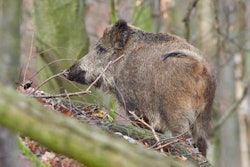
Pig farmers in Brandenburg will welcome news released last week that African swine fever (ASF) has been eradicated from almost 2,000 square kilometers in the east German state.
Restrictions in the infected area (exclusion zone II) have been completely lifted in four districts, according to the state government. Covering Barnim, the city of Frankfurt (Oder), Märkisch-Oderland, and Oder-Spree, the changes will mean a lifting of restrictions for local pig farmers and hunters. In addition, fences previously erected to control the movement of wild boar can now be removed. In a related move, the size of the buffer zone (exclusion zone I) can also be reduced.
ASF virus has not been detected in any animal in these districts for more than 12 months.
In Brandenburg, the infected zone has been reduced in size from around 4,500 square kilometers to 2,545 square kilometers, and it now covers just three districts.
State Secretary Dr. Antje Töpfer said these changes represent a major step forward in the fight against the disease.
During the month of February, the national veterinary agency, the Friedrich-Loeffler Institute recorded 30 ASF cases in wild boar. Of these, 26 were in the eastern state of Saxony, and four in the Spree-Neisse district of Brandenburg. At a nationwide total of 29, the number of cases confirmed over the previous 28 days appears also to be in decline.
Since 2021, ASF outbreaks have occurred in pigs at eight locations in Germany — most recently in a backyard herd in February 2023.
New ASF cases in domestic pigs in 4 European states
As of February 23, 57 outbreaks involving domestic swine has been officially registered by six of the region’s countries. This is according to the latest update in the Animal Disease Information System from the European Commission (EC). It monitors notifiable animal diseases in European Union (EU) member states, and most adjacent countries.
By that point, Serbia had confirmed the most outbreaks (21), followed by Romania (16) and Bosnia-Herzegovina (11). As well as these three states, also registering new cases since the previous edition on February 17 was North Macedonia, where the total outbreaks for the year so far has risen by two to three.
Over the past week, only Romania has officially reported further ASF outbreaks in domestic pigs to the World Organisation for Animal Health (WOAH). Recent cases were detected at three premises. Affected were one farm with 333 pigs in the west of the country, and two backyard herds in the same county in central Romania.
Outbreaks in wild boar pass 1,300
As of February 23, the total number of ASF outbreaks among Europe’s wild boar so far in 2024 had reached 1,339, according to the EC’s System.
This is an increase of 170 compared with the edition released seven days previously. The number of countries in the region registering one or more cases over the past two months remains unchanged at 20.
Italy continues to have recorded the most outbreaks so far this year with 295, followed closely by Poland (293). Next come Bulgaria (193), Latvia (112), Lithuania (101) and Hungary (87).
With the exception of Bulgaria, all these states confirmed additional cases over the previous seven days, as did Bosnia-Herzegovina, Croatia, Estonia, Germany, Romania, Serbia, Slovakia and Ukraine.
ASF developments in wild boar in Albania, Italy
In early February, Albania registered its first ever case of ASF.
According to the official notification to WOAH, testing positive for the virus were two wild boar were found dead at one location in a forest in Kukes. Source of the infection is unknown.
Kukes county is located in the northeast of this Balkan state, and the outbreak appears to be within 10 kilometers of the border with Kosovo.
Over the previous week, the number of ASF cases in Italy’s wild boar population has risen by a net figure of 27 to 1,654. This is according to regional veterinary authority IZSAM, and covers the period from the nation’s first cases on the mainland in January 2022 to date (as of March 4).
Since the February 25 update from IZSAM, further cases in wild boar were confirmed in the northern regions of Lombardy and Emilia-Romagna, as well as in Liguria and Piedmont in the northwest of Italy.
View our continuing coverage of the global African swine fever situation.

















